#ancient Greek festivals
Note
Do you know of any good resources on ancient Greek festivals? Festivals like Thesmophoria.
So, THE chief book on Greek religion generally remains Walter Burkert’s Greek Religion. If you’re interested in the topic, buy yourself a used copy. (Linking to Harvard UP, but you can probably find a copy out there for $5 or less if you don’t mind highlighting.)
Although published in 1987, and while sections have been superseded by more recent discussions, this is STILL the go-to book as a starting place. It’s just an astonishing, encyclopedic collection of knowledge and Burkert’s students (and their students) still dominate the field of Greek religion.
Let me also add the Oxford Classical Dictionary. Now in it’s 4th ed. (2012), this is another critical book for anyone interested in the ancient world. Check it for the individual entries on gods and festivals. It may not have the most up-to-date information, but it’s solid and, again, comprehensive. The link goes to the online version to which you can subscribe, but there’s a paper version too. It’s been out long enough that a cheaper used copy is available.
As for Demeter and especially Persephone, prominent in the Thesmophoria, Ellie Makin Roberts put out the very important Underworld Gods in Ancient Greek Religion, which was sadly out of price-range for most in hardcover. The paperback is more reasonable. I’ve linked to Routledge’s site, but you can find it cheaper elsewhere. (It’s currently on sale at Amazon as of 2/22/23.) Incidentally, she has another book coming out on the Greek goddesses later this year. It’s not academic in the same way as that listed, but much cheaper, and I expect it to be quite good.
Routledge does have a “Gods and Heroes” series, btw, which I quite like. These little books, written by specialists, are aimed at undergrad audiences and/or interested others. They’re great. BUT they don’t have Demeter or Persephone yet.
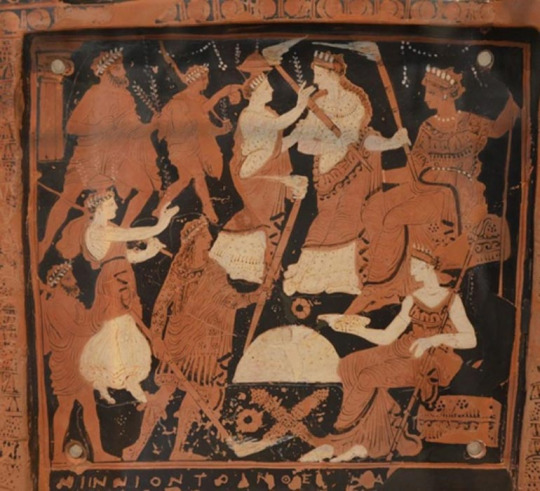
Information on specific festivals is usually best searched (on JSTOR or Google Scholar) by the name of the festival. I did a real quick search and here are three:
Sarah Iles Johnston has an article in History of Religions 52.4 (2013), 370-401: “Demeter, Myths, and the Polyvalence of Festivals.” I’ve not read it, but given who wrote it, I expect it’s an excellent discussion. (I just downloaded the PDF to save for later myself.) You’d need access to JSTOR to read it, or you can probably order a single copy.
Froma Zeitlin wrote “Cultic Models of the Female: Rites of Dionysos and Demeter,” in Arethusa, Vol. 15, No. 1-2 (1982), 129-57. Again, have not read it, but the name alone recommends it, although it may also be somewhat dated now.
Last, Chris Faraone has “Curses, Crime Detection, and Conflict Resolution at the Festival of Demeter Thesmophoros” in The Journal of Hellenic Studies, Vol. 131 (2011), pp. 25-44. Once more, the name alone is a recommendation.
So I’d suggest poking through Google Scholar to find articles. Or, again, if you’re at a uni, use your JSTOR access. Do recall that Aristophanes wrote a comedy called the Thesmophoriazusae,” so a lot of articles may address that rather than the festival. While the play does provide some useful info on the festival, the usual caveats apply when using drama, and especially comedy.
There’s some cool work being done on Persephone in S. Italy too, at Calabria and (Italian) Locris. You might be especially interested in the Persephoneion there: her sanctuary. These are part of the Magna Graecia diaspora.
#asks#Persephone#Demeter#Thesmophoria#bibliography on Greek religion#ancient Greece#ancient Greek religion#ancient Greek festivals#Classics#tagamemnon
104 notes
·
View notes
Text
hey, there know anything about ancient greek festivals for the gods ???
Kinda a desperate outreach but from the ancient greek religious calendars I've seen they're all sooooo confusing to me and I don't have any saved anywhere nor do I know where to find information on the festivals. Right now I am currently researching on theoi.com but would love it if anyone could reblog/comment with any help at all! :)
#hellenic devotion#deity worship#hellenic pagan#dionysus#apollo worship#apollo#dionysus devotee#aphrodite#helios#ancient greek festivals#hellenic calendar#helpol
4 notes
·
View notes
Text
Time Travel Question : Assorted Performances I
These Questions are the result of suggestions from the previous iteration.
This category may include suggestions made too late to fall into the correct grouping.
Please add new suggestions below if you have them for future consideration.
#Time Travel#Drama History#Ancient Athens#Ancient Greece#Hegelochus#Euripides#Orestes#Aristophanes#Dionysian Festival#Aeschylus#Lost Literature#Ancient Greek Literature#Oresteia#Homer#Classical Athens#Music History#Ancient World#Enheduanna#Ur#Sumerians#Ancient Egypt#Sappho#Epidaurus
107 notes
·
View notes
Text

The Heraean Games by Prospero Piatti
The Heraea was an Ancient Greek festival in which young girls competed in a footrace. The race was held every four years at Olympia, and probably took place around the same time as the ancient Olympic Games.
#heraean games#art#prospero piatti#heraea#ancient greek#ancient greece#festival#footrace#race#olympia#olympian#history#greece#greek#europe#european#olympics#olympic games
667 notes
·
View notes
Text
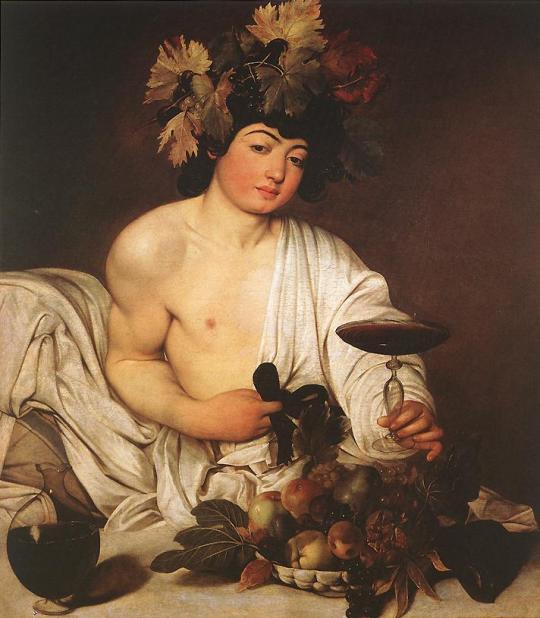
Happy Festival of Bacchus!
#festival of bacchus#bacchus#dionysus#ancient roman god of wine and agriculture#ancient greek god of wine and agriculture#ancient rome#ancient greece#greco-roman mythology
34 notes
·
View notes
Text
In the bizarre world of ancient festivals, our list reveals the darker side of historical celebrations, from bloodletting to stoning outcasts. Discover the strange customs that once defined festivities in ways you never imagined.
19 notes
·
View notes
Text

More here
#sanremo#sanremo 2024#musica italiana#meme Sanremo#sanremo festival#alfa cantante#loredana bertè#demeter#greek myths#ancient greek mythology#ancient greek
7 notes
·
View notes
Text
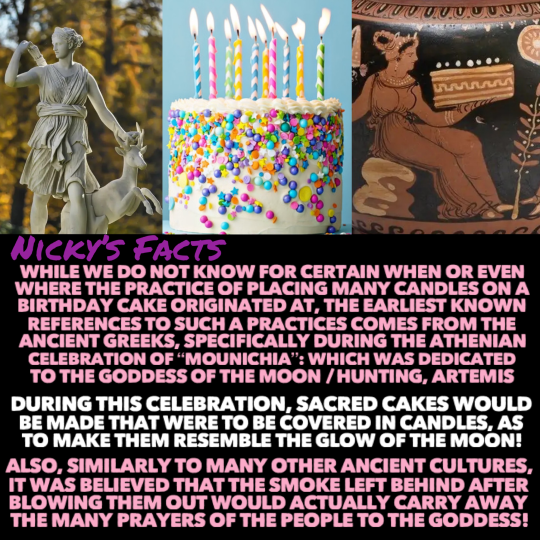
Do you eat cake with a goddess in the pale moonlight?🎂
🎂🏺🎂
#history#ancient greece#cake#candles#artemis#ancient greek history#festival#divine feminine#goddess#moon#birthday#athens#food#hellenistic#ancient history#greek mythology#birthday cake#femininity#moonlight#athenian history#mounichia#greek goddess#ancient festival#food history#nickys facts
35 notes
·
View notes
Text
Las Antesterias
🌷👻🍾🏺💀🍇
Las Antesterias es un festival griego antiguo que mucha gente celebra para honrar el dios Dionisio. Se cree que su nombre significa «fiesta de las flores». Usualmente el festival ocurre durante el mes moderno de febrero o marzo. Dura tres días y incluye una gran diversidad de asuntos, que pueden parecer un poco confuso para nosotros que quieren celebrar el festival. Por esa razón yo intentaré a explicar un poco para que más personas pueden disfrutar de las Antesterias!

Los tres días tienen sus propios nombres, temas, y actividades. Primero, hay Pithoigía, es decir «apertura de jarras», cuando se abra las botellas de vino del año pasado. Es un día para ofrecer vino nuevo al dios Dionisio. La gente adornen sus casas y sus mismos con flores de la primavera.
Segundo, hay Khóes, es decir «fiesta de las jarras». Es un día para vestirse en ropa festiva, visitar a los amigos, beber mucho vino (incluso las competencias de beber!), y jugar. También se ofrece agua, vino, o aciete de oliva en la tumbas de la familia. Finalmente, hay una ceremonia de boda entre una sacerdotisa especial con el dios Dionisio. (Esa ceremonia todavía es un poco misteriosa.)
Tercero y final, hay Khýtroi, es decir «fiesta de las marmitas». Es un festival de los muertos. Se ofrece comida al dios Hermes en su rol como guía de las almas al Inframundo. La comida típica es una mezcla de granos y semillas cocidano en una gachas que se llama panspérmia, o «todas semillas». Al final del día, los muertos están echados de las casas con el frase, «Fuera, espíritus! Ya no son las Antesterias!»
En total, es una celebración del inicio de la primavera, una ocasión para abrir los vinos del año pasado, y un tiempo para cuidar a los muertos errantes. Los dioses más importantes son Dionisio y Hermes.

Cómo celebrar la fiesta hoy en día? Puedes decorar un altar con flores y ofrecer un vaso de vino a Dionisio. Puedes tomar algo y jugar juegos con amigos, vestido en coronas de flores. Y también puedes cocinar gachas y compartirla con los espíritus y Hermes.
Qué te parece celebrar las Antesterias? 🤓👻🥳

(Definitivamente hay errores de español en este post - gracias por decirme amablemente dónde necesito corregirlos!)
#helenismo#dionisio#español#politeísmo#antesterias#personal#language arts#anthesteria#what's the market for spanish posts about ancient greek festivals#I used a horizontal post divider made by user plum98!#Dionysos#i worked on this post for so long that the festival is now over lmao but it's annual so that's probably fine
5 notes
·
View notes
Text
I just want to stress how cool the City Dionysia would of been for people. The great Panathenaea was cool but most of the shows were exclusive to men. And the competitions were useally very bloody aswell. In the City Dionysia men and women of all walks of life would be able to attend, in fact they had a fund to pay for poor people to see the shows. The celebration was annual and lasted five days. The first two were based mainly around lots of drinking and orgies, the next three would be entire days spent watching drama. Imagine that. Nine tragedies, five comedies and two satyr plays in total. Each one considerably long. It would of been pretty cool.




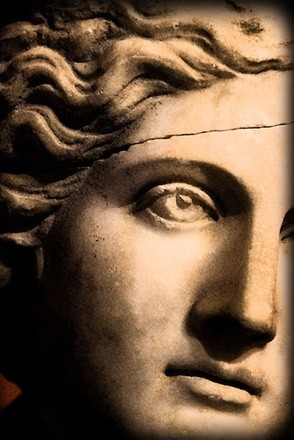

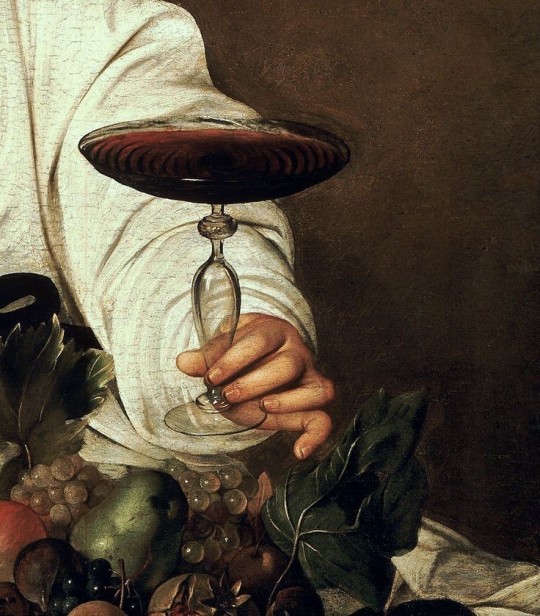
#greek mythology#City Dionysia#dionysus#dionysos#greek tragedy#satyr plays#greek comedy#ancient greece#greek drama#euripedes#sophocles#hellensism#greek festival
111 notes
·
View notes
Text
"Detienne, taking as his key the well-known myth that Adonis' pregnant mother Myrrha or Smyrna (both Greek words for myrrh) was metamorphosed into a myrrh tree, from whose trunk the newborn in due time emerged, sees Adonis as essentially the fruit of an aromatic shrub, a perfume, an anti-agricultural product. His method is to find a counter-phenomenon in Attic society, in response to which the Adonia can take their significance: surely the Thesmophoria, the autumn festival in honor of Demeter at which the women of Athens celebrated the growth of food crops. Detienne finds a further, sociological opposition here: the Thesmophoria were celebrated only by the wives of Athenian citizens; the Adonia were notoriously celebrated by prostitutes. He positions Adonis and the data of his cult within various oppositional codes discernible in Greek culture-each illustrated by a diagram-that parallel one another quite precisely, replicating the same meaning in different terms: aromatically, Adonis stands for heady perfume; botanically, for profitless agriculture; socially, for seduction and extramarital pleasure. The Adonia, Detienne declares, were a celebration of infertility and fruitless sex, a spectacular illustration of the dangers of untrammeled female sexuality, serving to balance and emphasize the autumn celebration of fruitfulness and legitimate connubiality in the service of the polis.
But much evidence slips through Detienne's grid. In several versions of the birth of Adonis myrrh has no place: in our earliest his mother is one Alphesiboea ([Hes.], fr. 139 M-W); in another she is one Metharme ([Apollod.], Bibl. 3.14.3). Philostephanus of Cyrene made him the son of Zeus alone (ap. [Probus] on Verg., Ecl. 10.18).22 As for the carnival of whores, the Adoniac festivities in brothels in Diphilus, fr. 42.38-41 PCG and Alciphron 4.14.8 (based on fourth-century comedy), are to be supplemented by Aristophanes, Lys. 391-96, and Menander, Sam. 35-50, in which wives and daughters of citizens celebrate the Adonia. Most surprisingly, Detienne's theory takes only passing account of the ritual lamentation, which ancient sources make the most conspicuous feature of the festival, and in general ignores what the celebrants themselves thought of what they were doing-unless we are to imagine that the women of Athens climbed onto their roofs once a year deliberately to celebrate their own failings to the community. There was probably another reason, one which feminist studies of the cult have begun to seek.
Another assumption, however, more fundamentally flaws Detienne's interpretation. While proposing to tease an inherent meaning from Athenian cult practice by identifying the inherent correspondences and oppositions within it, Detienne fails to define a perspective more specific than a homogeneous Greco-Roman society. Adonis, for example, must have meant many things to many people at many times (even different things to the same people at different times), but Detienne's formula assumes that he meant essentially the same thing to everybody, no matter how many borders of nation, culture, language, gender, or time he may have crossed-as if any detail of the myth of Adonis tapped into one immanent meaning and could be adduced for the significance of the Athenian cult. Rhetorical motives are undifferentiated: a line of Sappho is treated equally with a line of Philodemus; the testimony of Aristophanes is put on a par with the testimony of St. Cyril. This method is programmatic and derives from Levi-Strauss, who articulates the principle thus vis-A-vis his interpretation of Oedipus: "[W]e define the myth as consisting of all its versions; or to put it otherwise, a myth remains the same as long as it is felt as such." Combining details from diverse myths of Adonis, regardless of date or provenance, Detienne treats the resulting conglomeration as a single sacred tale holding a precious key to the meaning of the ritual. But for whom does it hold meaning? For Detienne alone. Purportedly context-based, his method actually isolates phenomena from their diverse cultural uses and recontextualizes them into an artificial code that transcends the messy inconsistencies of Greek thought."
- The Sexuality of Adonis by Joseph D. Reed
#adonis#adonia#festivals#ancient greece#greek mythology#structuralism#excerpts#article#and this is why I have such a bad time reading the writings of Detienne and other structuralist classicists#not that they don't write a lot of interesting and insightful stuff#but the homogenizing of all versions of a myth (no matter the date or author or language) into one coherent account#and the extrapolation of meaning from that one ahistorical version that the author has just created#is just not something I care about#and I also feel that the interpretation of the gods from a structuralist perspective can be reductive#and necessitates the ignoring or dismissal of sources that don't fit so neatly into the proposed binary#ex: Poseidon=brute force of nature so he engenders the horse; Athena=civilization and technology so she creates the bridle to tame it#just ignore that in some sources it is Poseidon himself who invents the bridle#I mean yeah the idea does have merit#but ancient Greek mythology and religion are complex and messy and diverse and even contradictory
12 notes
·
View notes
Text
🌿🍷🍇ἐλήλυθε Διονύσια τὰ Μεγάλα.🍇🍷🌿
Happy City Dionysia to all who celebrate! 🎉🎉
As for me, I have my 🎭reading list🎭 ready:
Bacchae, by Euripides
Seven Against Thebes, by Aeschylus
Ajax, by Sophocles
Philoctetes, by Sophocles
Cyclops, by Euripides
Oedipus Rex, by Sophocles
Oedipus at Colonus, by Sophocles
Antigone, by Sophocles
The Birds, by Aristophanes
The Frogs, by Aristophanes
The Clouds, by Aristophanes
Thesmophoriazusae, by Aristophanes
And of course, listening to musicals.
Also, the grape juice tastes great.
#Dionysia#hellenism#dionysus#greek plays#not a pagan#nor a greek#but imma celebrate it anyway bc I feel the vibe to do it#and instead of watching plays I’ll read them#life is too boring without a little decoration#say celebrating an ancient festival#and I’ll be watching movies#listening to musicals like epic and hadestown#that’s fun from my perspective
3 notes
·
View notes
Text
The Great Dionysia, also known as the Festival of Dionysus, was an ancient Greek dramatic festival held in honor of Dionysus, the god of wine, festivity and theatre, amongst other things. During the festival, playwrights would compete to entertain the Athenian masses. Many famous playwrights, as well as famous plays, have won the contests in the festival. For example, Aeschylus' Seven Against Thebes won in 467 BC and Sophocles' Oedipus Rex took second place in 427 BC.
Bonus: A flyer I made for the festival with some added information about the events!
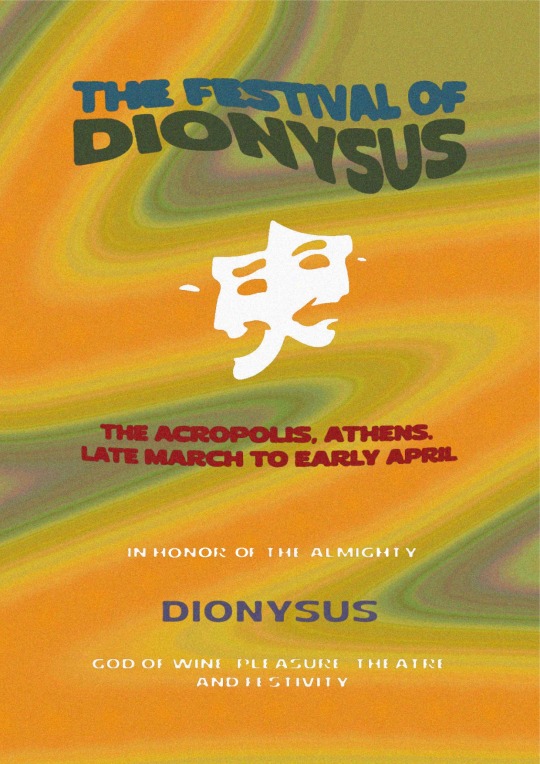
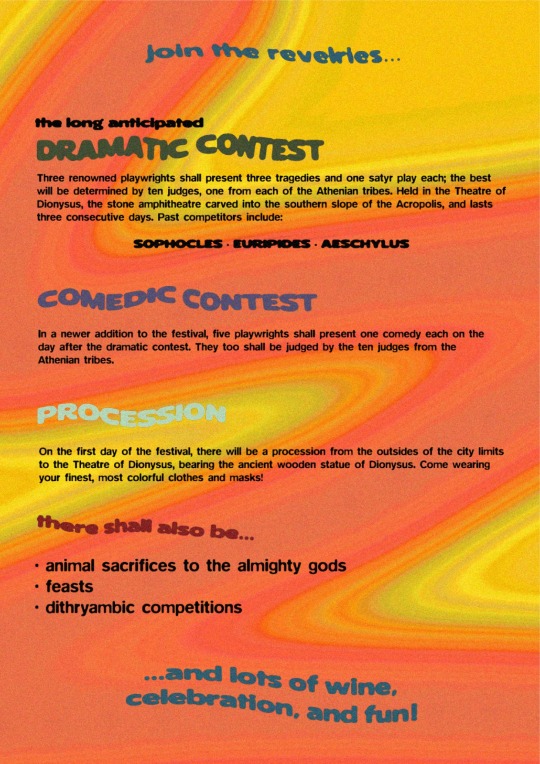
#history#ancient history#ancient greece#dionysus#sophocles#aeschylus#classics#the festival of dionysus#greece#ancient greek history#.#q
10 notes
·
View notes
Text
It’s going to be the Chinese mid autumn festival/moon cake festival soon! It’s also Deipnon today, which is a Hellenic polytheist holiday that follows the lunar cycle. As a result, I’m going to offer some moon cake to Hekate ❤️
Being a person of color and a Hellenic polytheist are 100% compatible and you do not have to give up your culture to worship the Theoi.
Syncretization has always been a part of Hellenic polytheism, and while it hasn’t always been consensual, integrating Hellenic polytheism with local, indigenous cultures is very much a thing for thousands of years.
Another example is that I am also Filipino, and the Philippines pre-colonization had extensive and deeply significant tattoo traditions.
However, tattoos in the Ancient Greek world were historically not permitted and considered bad.
I have multiple devotional tattoos to Aphrodite Areia because tattoos were one way that my people showed connection to our gods and spirits, to our societies, and to ourselves. This is a custom of my culture and I don’t have to give it up to be a Hellenic polytheist, just because it was once taboo in another cultural context. I like to think the gods would encourage it, even.
Happy Deipnon and 中秋快乐!
#hellenic polytheist#hellenic polytheism#hellenic reconstructionism#hellenic pagan#ancient greece#ancient greek mythology#mid autumn festival#moon cake#ancient greek religion#person of color
9 notes
·
View notes
Text
some of y’all need to actually learn about greek culture past your woobified, commercialized version of ancient greece & greek mythology it’s embarrassing
#like go outside go to a greek festival consume contemporary greek media like…..#as a greek yall give me the heebie jeebies#greek#greek mythology#ancient greece
2 notes
·
View notes
Text
I can't believe I missed Saturnalia this year
#unbelievable#Christmas#saturnalia#rome#ancient rome#latin#ancient greece#ancient greek#ancient#festival#pagan#merry christmas#bona saturnalia
3 notes
·
View notes